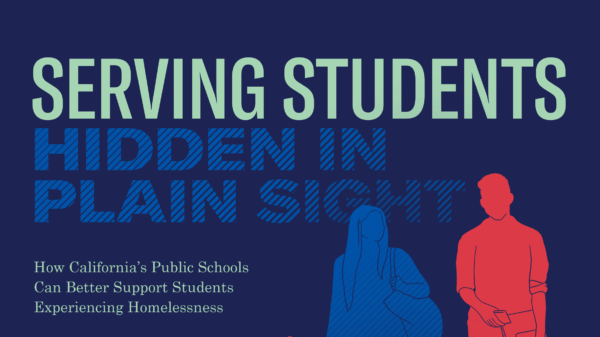Reports Find that School Liaison Programs Lack Resources to Provide Effective Support
LOS ANGELES — There are more than 200,000 K-12 students who are homeless in California, according to the state's Department of Education. At California's community colleges, roughly 1 in 5 students are also without a home. Federal and state laws require that schools to designate liaisons to identify these students, help them enroll in school, and connect them with a wide variety of services to help them succeed in school.
But reports released today by California Homeless Youth Project and the ACLU Foundations of California and show that liaisons — no matter how well intentioned — are not given the capacity, funding, training, and other resources to do their jobs effectively. In numerous cases, students who are eligible for aid programs are not even aware that they could qualify for them.
"Most children and youth experiencing homelessness do not know they are eligible as 'homeless' or have additional rights and resources available to them," said Alexis Piazza, Equal Justice Works fellow at the ACLU Foundation of Southern California. "Only through deliberate and aggressive state-wide action will we ensure students experiencing homelessness are not hidden in plain sight."
The liaison programs are especially important because, for students experiencing homelessness, school is often the most stable part of their day and represents an immense opportunity to improve their lives.
"Young people experiencing homelessness often feel that education is a pathway out of poverty and into stability — that's a dream we need to turn into reality," said Shahera Hyatt, director of the California Homeless Youth Project, a research and policy initiative of the California Research Bureau.
The reports — one on K-12 programs and the other focusing on community colleges — were the result of hundreds of survey results and follow-up interviews with liaisons.
School district homelessness liaisons have been required since 1987 by the federal McKinney-Vento Homeless Assistance Act. In California, the Success for Homeless Youth in Higher Education Act passed in 2016 requires community colleges to designate at least one liaison on each campus to serve students experiencing homelessness.
But the reports released today found that designated liaisons often are assigned other duties that keep them from adequately focusing on students who are homeless. About two-thirds of K-12 and community college liaisons said they spend five or fewer hours a week on homelessness liaison duties. As one liaison quoted said, "I am in crisis mode and cannot proactively respond to the needs of homeless students and families."
Liaisons don't even have time, in some areas, to effectively inform other school personnel on the guidelines for designating a student eligible for aid programs. Under federal law, students are homeless if they "double up" with other families or friends because they've lost their own housing due to finances, or live in abandoned buildings, substandard housing, campgrounds, or bus stations, among other places.
As one quoted liaison said, "many staff members do not understand that homelessness does not only mean living out of a car or on the street."
The reports also illuminate the challenges liaisons face in supporting students. In particular, liaisons reported that housing was students' greatest need, but also the hardest need to meet. To address these challenges, the reports call for additional investments in housing and stronger connections between the education and housing systems.
State legislators are already taking action to address problems included in the reports. Assembly member Luz Rivas recently introduced AB 16 that would make additional investments in state- and county-level homeless education programs.
"We must develop a more robust solution for identifying these children we are calling the 'hidden homeless,'" Rivas said. "AB 16 establishes a comprehensive policy approach to assist local communities trying to tackle the growing crisis of child homelessness. This is a very personal issue for me and I look forward to working with ACLU and CHYP to continue addressing the needs of our homeless children."
Also under consideration in the state legislature is AB 302 that would allow community college students to sleep overnight in cars parked in school lots.
Read the K-12 report "Serving Students Hidden in Plain Sight" here: https://www.aclusocal.org/app/uploads/drupal/sites/default/files/homelessk12report_aclu_r4_digital.pdf
Read the community college report "Supporting Students Experiencing Homelessness" here: https://www.aclusocal.org/app/uploads/drupal/sites/default/files/homelesscommcollegereport_chy_digital.pdf
###
Stay Informed
Sign up to be the first to hear about how to take action.
By completing this form, I agree to receive occasional emails per the terms of the ACLU’s privacy statement.
By completing this form, I agree to receive occasional emails per the terms of the ACLU’s privacy statement.


